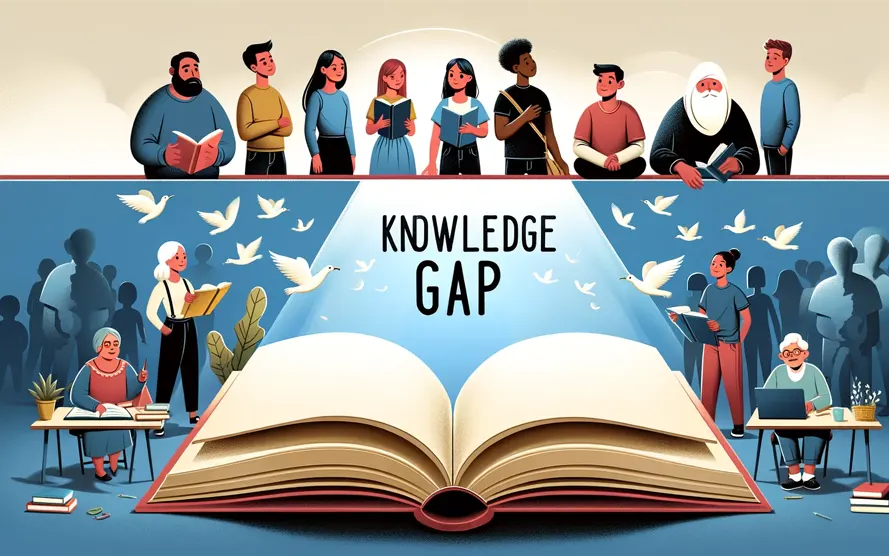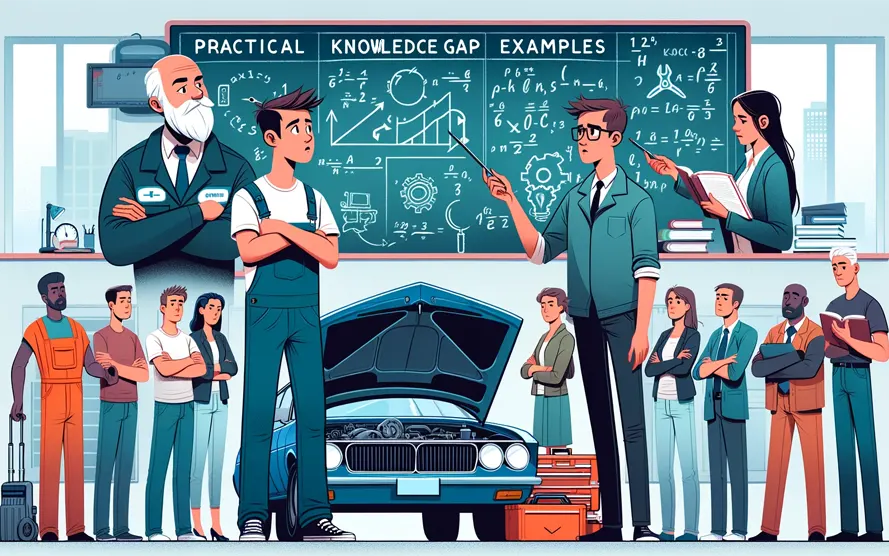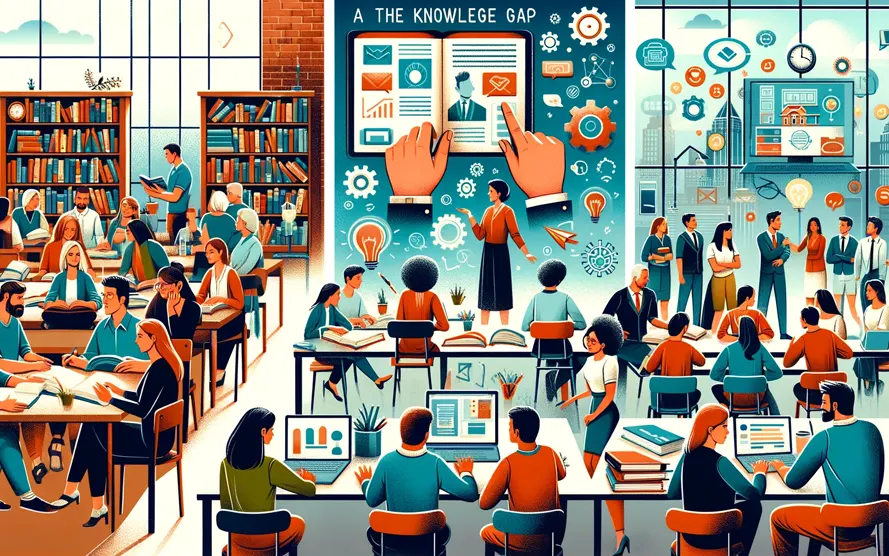In the vast realm of knowledge, there are inevitable spaces of non-understanding, identified as knowledge gaps. But what is a knowledge gap in essence? How can it be utilized in various industries such as business? This article aims to thoroughly delve into the knowledge gap definition, its implications, and how it is used in different contexts.

Understanding the Knowledge Gap
A knowledge gap is the chasm between what is known and what is yet to be known. It’s that void of unanswered questions, unexplored ideas, and undiscovered truths. In a nutshell, it’s the difference between what we know and what we don’t. Whether it be in academia, business, or our personal lives, knowledge gaps persist everywhere.
The Theory Behind the Knowledge Gap
The knowledge gap theory postulates that in a society, this void of knowledge isn’t distributed equally. Essentially, people with higher socio-economic status acquire information at a faster rate than those with a lower socio-economic status. This phenomenon widens the knowledge gap, and as a result, a disparity in knowledge exists among different sections of the population.
The Meaning of Knowledge Gap
A knowledge gap isn’t just about missing information. It’s a broader term that refers to a lack of understanding or skills in a specific area. This could be anything from a lack of tech skills to a limited understanding of different cultures.
The Knowledge Gap Hypothesis
The knowledge gap hypothesis suggests that people with more money and education tend to learn new things faster than those who don’t. This means that over time, the gap between the “haves” and “have-nots” of information grows wider.
Real-world Examples of Knowledge Gaps
Here are some examples of knowledge gaps that we encounter in everyday life:
Education
- Student: A high school student who excels in English literature but struggles with algebra.
- Teacher: A teacher who is experienced in traditional classroom teaching but is unfamiliar with online learning platforms and tools.
Technology
- Senior Citizen: An older adult who is comfortable with basic computer tasks but is intimidated by smartphones and social media.
- Tech Professional: A software developer who is skilled in programming languages but lacks knowledge of cybersecurity best practices.
Healthcare
- Patient: A patient who understands their medical condition but is unaware of available treatment options and support groups.
- Healthcare Provider: A doctor who is knowledgeable about the latest medical treatments but is unfamiliar with the cultural and social factors that impact patient health.
Business
- Entrepreneur: A business owner who is skilled in marketing but lacks knowledge of financial management and accounting.
- Employee: A worker who is proficient in their job role but lacks the soft skills necessary for effective teamwork and communication.
These examples illustrate how knowledge gaps can hinder personal and professional growth, as well as societal progress. By recognizing and addressing these gaps, individuals and organizations can improve their capabilities and achieve their goals.

The Process of Knowledge Gap Analysis
Identifying these gaps is the first step towards filling them, and knowledge gap analysis is the tool for the job. It’s a systematic process used to identify the gaps in skills, knowledge, and capabilities between the current and desired state. This process helps individuals, teams, and organizations to identify what they need to learn and develop to improve performance and achieve their goals.
The Rationale Behind Knowledge Gap Analysis
By pinpointing the areas of deficiency, knowledge gap analysis allows for targeted learning, development, and growth. It helps to map out a clear plan of action to eliminate these gaps and foster the optimal utilization of resources. The ultimate aim is to ensure a smooth and effective path towards the achievement of the desired state of knowledge or skillset.
Knowledge Gap in Business: An Integral Concern
The role of the knowledge gap in business is a crucial one. Companies that consistently perform knowledge gap analysis can identify gaps in their market understanding, strategic planning, or employee skills.
Market Understanding
Companies must understand their customers’ needs to provide relevant and valuable products or services. If a business is unaware of these needs, a knowledge gap exists which can negatively impact the business’s market competitiveness.
Strategic Planning
Strategic planning involves defining an organization’s direction and making decisions on allocating resources to pursue this strategy. A gap in understanding market trends, competition, or internal capabilities can lead to ineffective strategic decisions.
Employee Skills
Employees need the right skills to perform their jobs effectively. A knowledge gap in a critical skill area can lower employee productivity and hamper the business’s growth.
How to Address the Knowledge Gap?
Addressing knowledge gaps isn’t about amassing all the knowledge you can lay your hands on. Rather, it’s about honing in on the gaps that truly matter to your context. Here are some strategies for addressing knowledge gaps:

- Identify the Gap: Use tools like SWOT analysis, skills assessments, and feedback mechanisms to identify where the gaps exist.
- Prioritize: Not all gaps need immediate attention. Prioritize based on the gap’s impact on your goals.
- Create a Learning Plan: Based on your priorities, create a learning plan that includes resources, timelines, and measurable objectives.
- Implement: Put the plan into action and start learning.
- Review: Regularly review and adjust your plan as needed to ensure that you’re making progress towards filling your knowledge gaps.
The Power of Recognizing and Addressing Knowledge Gaps
The first step to learning is recognizing that there’s something you don’t know. It’s not about admitting weakness, but about embracing opportunity. Knowledge gaps aren’t limitations; they’re invitations to grow.
Whether you’re an individual, a team, or an entire organization, a culture of continuous learning can drive significant progress. By identifying and addressing knowledge gaps, we can unlock our full potential.
So, take a moment to reflect. What don’t you know? The answer might surprise you, but it’s these surprises that fuel the journey of learning and growth. After all, it’s not just the destination that matters, but the exciting path we take to get there.


